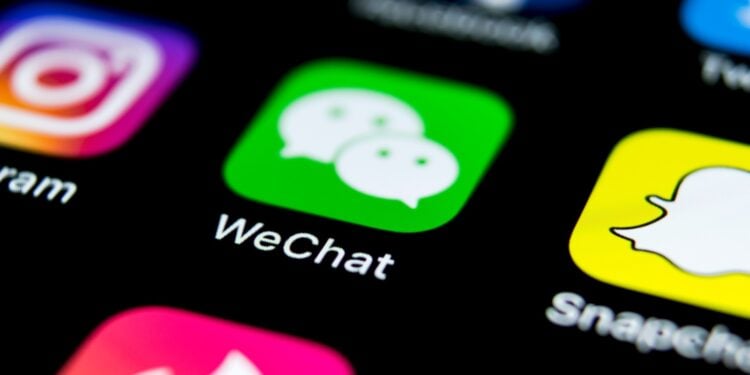While Apple faces increasing regulatory pressure on its App Store business in many countries, a deal has been struck in China that opens up a completely new revenue stream for the company. The agreement with Tencent, the operator of the super app WeChat, could bring the corporation billions in additional commissions.
The dynamics of digital commerce are changing worldwide. Legislators and competition authorities in many markets are taking action against Apple's App Store policies. The mandatory use of Apple's proprietary payment system for in-app purchases is particularly under fire. While the company is forced to allow alternative payment methods in Europe, the US, and South Korea, China is taking a completely different approach – not through legislation, but through negotiation. The agreement with Tencent demonstrates that Apple can develop new revenue models even outside of traditional structures.
WeChat dominates the daily lives of Chinese iPhone users
In China, user behavior differs significantly from that in Western markets. Instead of using different apps for different services, the majority of all digital activities are handled via a single application: WeChat. With over a billion active users, WeChat is not just a messenger service, but a comprehensive digital ecosystem – comparable to a second operating system within the iPhone.
Almost every aspect of daily life can be organized via so-called mini-programs within WeChat. These include messaging, paying bills, booking taxis, online orders, buying movie tickets, mobile games, flight check-ins, money transfers, doctor's appointments, accessing bank accounts, searching for books, dating, and even fundraising. A 2020 survey of over one million Chinese iPhone users revealed that 95 percent would rather give up their iPhone than WeChat.
No commissions for Apple so far through mini-apps
This highly centralized app usage pattern was long a disadvantage for Apple. Transactions conducted within WeChat mini-apps typically bypassed Apple's payment system. App developers used their own or third-party payment services, thus circumventing the App Store commission, which is usually up to 30 percent. Despite enormous revenues in the Chinese app market, Apple was therefore excluded from a large portion of potential income.
For years, the company tried to exert influence over this system – so far without success. Tencent controlled the payment processing and long resisted demands from Cupertino. As a result, Apple missed out on a significant portion of revenue from one of the world's most important smartphone markets.
Apple and Tencent reach an agreement after a year of negotiations
After roughly a year of negotiations, an agreement has now been reached. According to a Bloomberg report , Apple and Tencent have agreed that payments in WeChat mini-apps will henceforth be processed through Apple's system. In return, Apple will receive a 15 percent commission on corresponding revenue. This primarily affects mini-games and smaller applications within the platform.
While the agreed-upon commission rate is significantly below the standard 30 percent, it grants Apple access to this previously inaccessible revenue stream. At the same time, the agreement relieves Tencent, which faced regulatory uncertainties and technical pressure from Apple. For both sides, the deal is a compromise – but one with considerable financial potential.
Billions in potential through WeChat payments
The Chinese market is not only large, but also highly active. Countless transactions are processed daily through WeChat alone – particularly in the area of mini-games, which are enormously popular in China. This deal gives Apple access to a volume that could reportedly generate several billion US dollars in additional revenue annually.
The exact scope depends on how quickly and comprehensively the switch to Apple's payment system is implemented within WeChat. It is also still unclear whether other categories – such as services or physical products – will also be subject to Apple's commission in the future. Currently, the agreement focuses primarily on digital purchases in mini-games and small apps.
A change of strategy in China brings Apple a new source of billions
While Apple is increasingly forced to relax or abandon its existing commission models in Western markets, the agreement with Tencent in China is creating a new, growing revenue stream. The WeChat deal demonstrates Apple's willingness to adapt flexibly to local markets – and to do so through negotiation rather than regulation.
For Apple, this not only strengthens its position in the world's most important smartphone market, but also represents a strategically important step toward diversifying its App Store revenue. The 15 percent commission from WeChat mini-apps gives the company access to a previously inaccessible market segment – with the prospect of billions of dollars that Apple has previously missed out on. (Image: Shutterstock / BigTunaOnline)
- Netflix subscriptions are getting more expensive: New tariffs are coming to Europe
- iOS 26.2: An overview of all the new features from Beta 2
- macOS 26.2 introduces Edge Light for clearer and brighter video calls.
- iOS 26.2: Apple Games receives three important improvements
- iOS 26.2 adds an important toggle for chats to CarPlay.
- iOS 26.2 Beta 2 released: Apple starts new testing phase
- GPT-5.1: OpenAI makes ChatGPT warmer and smarter
- Apple study: DMA does not lead to lower App Store prices
- Apple officially kicks off Christmas 2025 with new decorations
- Apple Arcade brings new gaming highlights in December 2025
- Google confirms: Apple was right about AI
- Apple and AI: From laggard to strategic winner
- Introducing Nomad Tracking Card Pro: Design meets function
- Apple unveils the iPhone Pocket by Issey Miyake
- Apple Car Key: Why the digital car key is stalling
- Apple TV will remain ad-free – Eddy Cue confirms strategy
- tvOS 26.2: Two changes make Apple TV 4K more versatile
- WhatsApp is testing a new security feature for vulnerable accounts.
- Apple TV celebrates four Grammy nominations for 2026
- iOS 26.1: Apple Music AutoMix now works with AirPlay





